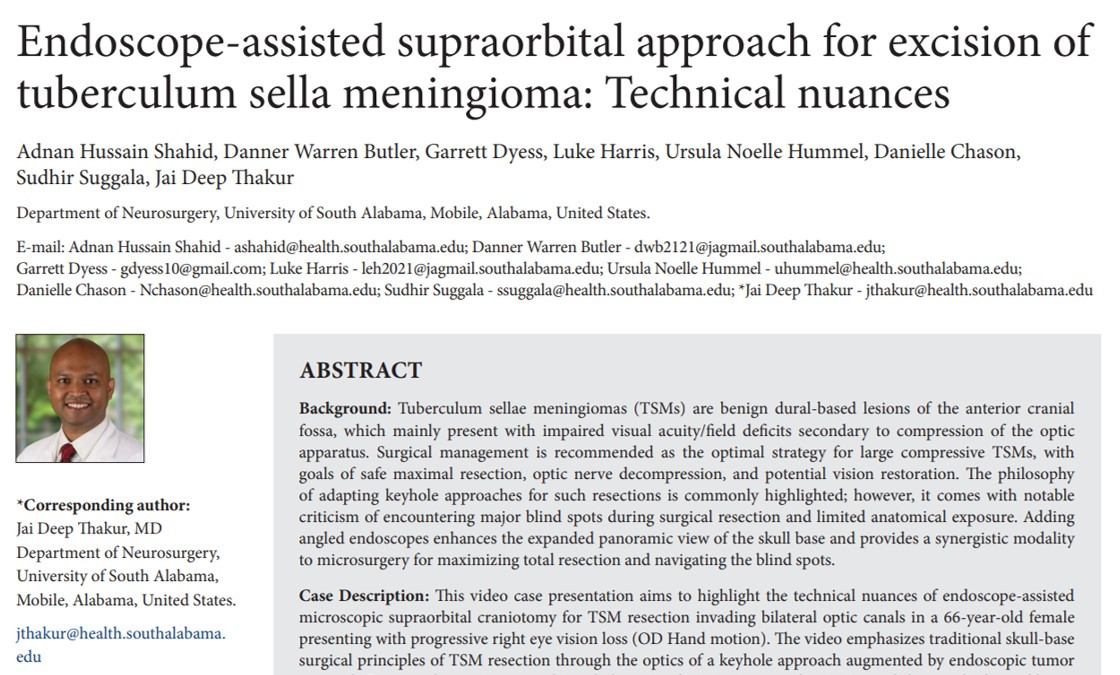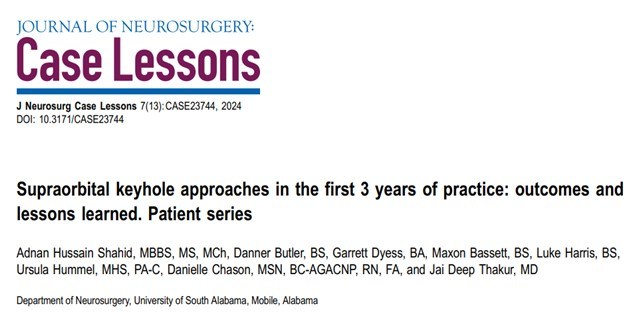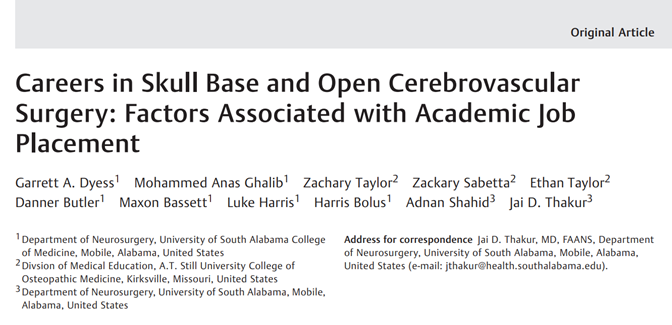USA Health skull base team makes notable contributions at 33rd North American Skull Base Society Meeting
The North American Skull Base Society is the most prestigious skull base society in the United States and gathers academic research contributions from all over the world.
Representing the Whiddon College of Medicine and USA Health, medical students, faculty and other providers from the Department of Neurosurgery made significant contributions at a recent meeting of the North American Skull Base Society (NASBS) in Atlanta.

The NASBS is the most prestigious skull base society in the United States and gathers academic research contributions from all over the world. The theme for the 33rd annual meeting was “The Skull Base is Flat.”
“These collaborative efforts involved a diverse team of neurosurgery fellows, medical students, physician assistants, and attending physicians, reflecting the wide-ranging impact and dedication of individuals at various stages of their medical careers,” said Jai Deep Thakur, M.D., director of minimally invasive cranial and skull base neurosurgery at USA Health. “These achievements highlight the commitment of the Whiddon College of Medicine and USA Health to advancing neurosurgical education and research through teamwork and interdisciplinary collaboration.”

At the conference, Adnan Shahid, MBBS, a minimally invasive cranial and skull base neurosurgery fellow at USA Health, led a podium presentation on the “Endoscopic-Assisted Supraorbital Approach for Removal of Tuberculum Sella Meningioma: Technical Nuances in Keyhole Surgery.” The presentation was based on techniques Thakur, who is also an assistant professor of neurosurgery at the Whiddon College of Medicine, had utilized and fostered in his practice. Shahid went on to publish this technique in Surgical Neurology International journal.

In addition, Shahid took a lead on publishing Thakur’s experience of using eyebrow craniotomy in skull base and brain tumor surgeries. To date, no other papers have described the use of trans-ciliary eyebrow craniotomy in managing complex brain tumors and skull base pathologies in a neurosurgeon's early career, Thakur said. The seminal findings of the paper, published in the Journal of Neurosurgery: Case Lessons, were reduced length of stay, significantly low complications and readmissions, and substantially low usage of typical narcotics.

Garrett Dyess, a first-year medical student at the Whiddon College of Medicine, presented a poster at the NASBS meeting and published a manuscript titled, “Careers in Skull Base and Open Cerebrovascular Surgery: Factors Associated with Academic Job Placement” in the Journal of Neurological Surgery Skull Base. The study emphasized the role of early mentorship in guiding neurosurgery residents toward academic careers, particularly in the field of skull base surgery.
“Very early in his career, Garrett has shown commitment to advancing the field of neurosurgery. He continues to flourish and expand his academic pursuits to include skull base, neuro-oncology and complex spine along with a focus on publishing papers on neurosurgery education,” Thakur said.
Danner Butler, a-fourth year medical student at the Whiddon College of Medicine and aspiring neurosurgeon, was an integral part of the research. Among others, Butler led the project “Analysis of Medical Malpractice Indemnity Payments and Litigation Verdicts in Skull Base Neurosurgical Practice: A 20-Year Nationwide Study.” This unique study discussed various factors that influence decision-making in various medico-legal litigations at a national level. Butler also presented “The Role of Keyhole Supraorbital Craniotomies in Skull Base and Brain Tumor Surgeries” at grand rounds presentations at the University of Alabama at Birmingham and the University of Virginia during his away rotations in neurosurgery.
Ursula Hummel, PA-C, a physician assistant in the neurosurgery department at USA Health, was one of the very few advanced-practice providers at the NASBS meeting contributing to academic skull base neurosurgery. In addition to contributing to the aforementioned research, she is leading a study highlighting “The Value of Advanced Practice Providers in Fostering the Development of Elective Early Academic Skull Base Practice without Residents/Fellows in a Tertiary Academic Center.”
“Ursula continues to evolve as a 'triple threat' in the APP world, where she has demonstrated her commitment in clinical work, teaching and contribution to academic neurosurgery,” Thakur said.
Additionally, Thakur was invited to moderate a video session on endoscopic skull base and reconstruction along with a peer from the University of California, Irvine.




